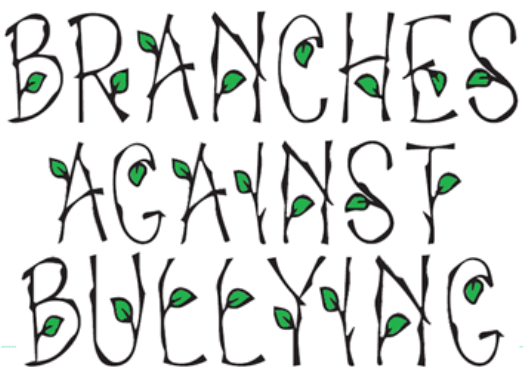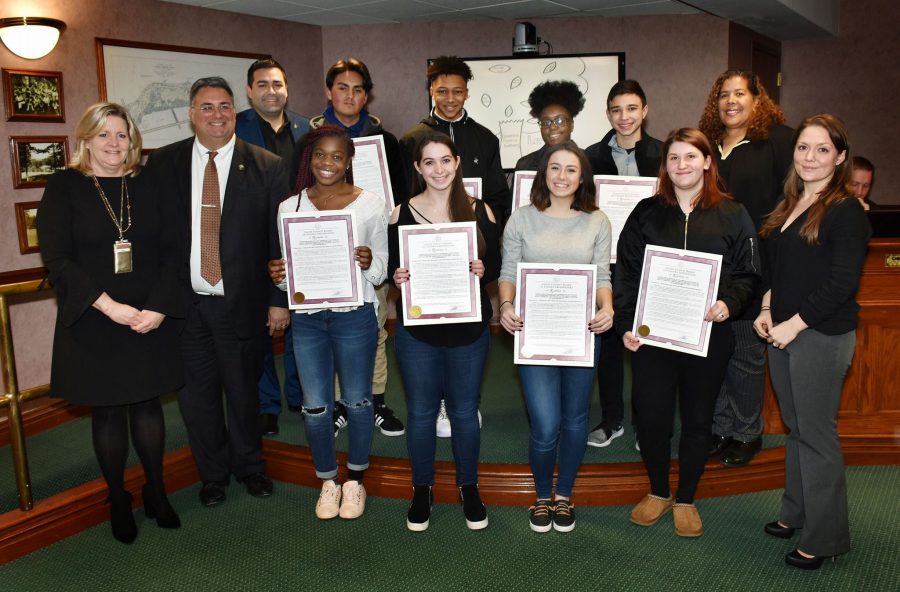Union County Freeholder Chairman Sergio Granados presents checks and resolutions to students and teachers congratulating them on winning the 2018 UC STEP Start Now Grant and the participating in the UC STEP “Branches Against Bullying” Civic Engagement Campaign. They were joined by Assemblywoman Linda Carter, Union County Deputy Manager Amy Wagner and Deana Mesaros of the Union County Department of Economic Development.
The first place winner of the UC STEP Start Now Grant “Branches Against Bullying” is Alexander Hamilton Preparatory Academy in Elizabeth ($1,000). New Providence High School, Union County TEAMS Charter School and Governor Livingston High School in Berkeley Heights received Honorary Mentions ($250 each)
UC STEP (Union County Student Training & Enrichment Program) was created to provide high school students the opportunity to develop a countywide community service around a topic they feel is important, while teaching them leadership, personal growth skills, and responsibility within their communities.
Video from Jenga Game
[ezcol_2fifth] [/ezcol_2fifth] [ezcol_3fifth_end]
Resource Guide
To END Bullying
What is Cyberbullying
Cyberbullying is bullying that takes place over digital devices like cell phones, computers, and tablets. Cyberbullying can occur through SMS, Text, and apps, or online in social media, forums, or gaming where people can view, participate in, or share content. Cyberbullying includes sending, posting, or sharing negative, harmful, false, or mean content about someone else. It can include sharing personal or private information about someone else causing embarrassment or humiliation. Some cyberbullying crosses the line into unlawful or criminal behavior.
The most common places where cyberbullying occurs are:
- Social Media, such as Facebook, Instagram, Snapchat, and Twitter
- SMS (Short Message Service) also known as Text Message sent through devices
- Instant Message (via devices, email provider services, apps, and social media messaging features)
Special Concerns
 With the prevalence of social media and digital forums, comments, photos, posts, and content shared by individuals can often be viewed by strangers as well as acquaintances. The content an individual shares online – both their personal content as well as any negative, mean, or hurtful content – creates a kind of permanent public record of their views, activities, and behavior. This public record can be thought of as an online reputation, which may be accessible to schools, employers, colleges, clubs, and others who may be researching an individual now or in the future. Cyberbullying can harm the online reputations of everyone involved – not just the person being bullied, but those doing the bullying or participating in it. Cyberbullying has unique concerns in that it can be:
With the prevalence of social media and digital forums, comments, photos, posts, and content shared by individuals can often be viewed by strangers as well as acquaintances. The content an individual shares online – both their personal content as well as any negative, mean, or hurtful content – creates a kind of permanent public record of their views, activities, and behavior. This public record can be thought of as an online reputation, which may be accessible to schools, employers, colleges, clubs, and others who may be researching an individual now or in the future. Cyberbullying can harm the online reputations of everyone involved – not just the person being bullied, but those doing the bullying or participating in it. Cyberbullying has unique concerns in that it can be:
Persistent – Digital devices offer an ability to immediately and continuously communicate 24 hours a day, so it can be difficult for children experiencing cyberbullying to find relief.
Permanent – Most information communicated electronically is permanent and public, if not reported and removed. A negative online reputation, including for those who bully, can impact college admissions, employment, and other areas of life.
Hard to Notice – Because teachers and parents may not overhear or see cyberbullying taking place, it is harder to recognize.
What is bullying
Bullying is unwanted, aggressive behavior among school aged children that involves a real or perceived power imbalance. The behavior is repeated, or has the potential to be repeated, over time. Both kids who are bullied and who bully others may have serious, lasting problems.
In order to be considered bullying, the behavior must be aggressive and include:
- An Imbalance of Power: Kids who bully use their power—such as physical strength, access to embarrassing information, or popularity—to control or harm others. Power imbalances can change over time and in different situations, even if they involve the same people.
- Repetition: Bullying behaviors happen more than once or have the potential to happen more than once.
Bullying includes actions such as making threats, spreading rumors, attacking someone physically or verbally, and excluding someone from a group on purpose.
Types of Bullying
There are three types of bullying:
 Verbal bullying is saying or writing mean things. Verbal bullying includes:
Verbal bullying is saying or writing mean things. Verbal bullying includes:
- Teasing
- Name-calling
- Inappropriate sexual comments
- Taunting
- Threatening to cause harm
 Social bullying, sometimes referred to as relational bullying, involves hurting someone’s reputation or relationships. Social bullying includes:
Social bullying, sometimes referred to as relational bullying, involves hurting someone’s reputation or relationships. Social bullying includes:
- Leaving someone out on purpose
- Telling other children not to be friends with someone
- Spreading rumors about someone
- Embarrassing someone in public
 Physical bullying involves hurting a person’s body or possessions.
Physical bullying involves hurting a person’s body or possessions.
Physical bullying includes:
- Hitting/kicking/pinching
- Spitting
- Tripping/pushing
- Taking or breaking someone’s things
- Making mean or rude hand gestures
- Bullies love a reaction, don’t give them one. Stay calm.
- Stand up straight and don’t show the bully that you are afraid or that your feelings are hurt.
- Be alert. Think fast. How can you get out of the situation safely?
- Fighting back can make the situation worse, and you may get hurt. Get away. Find safety or call for help.
- Talk to an adult you trust for ideas and help.
- Have a plan for dealing with bullies. Think of things to say ahead of time and practice them at home.
- Get help. Report the situation to the school and your parents.
- What happened to you and how you reacted
- Who bullied you and who saw it happen
- Where it happened and if it’s happened before
- Write down everything including things that other kids or adults did to help you
What if someone else is being bullied?
 Most of the time bullying takes place, other kids are watching. These bystanders, as they’re called, have the power to help stop bullying. In fact, when other kids step in, bullying stops within 10 seconds, 57% of the time. Most kids feel uncomfortable watching but few intervene because they are afraid or don’t know what to do.
Most of the time bullying takes place, other kids are watching. These bystanders, as they’re called, have the power to help stop bullying. In fact, when other kids step in, bullying stops within 10 seconds, 57% of the time. Most kids feel uncomfortable watching but few intervene because they are afraid or don’t know what to do.
You can:
- Go for help if the situation is dangerous or you are unsure or afraid.
- Walk away. Don’t be an audience for the bully. Get help.
- Be a buddy to the victim. Invite them to join you.
- Speak up…a simple “you’re being a bully” might be enough to stop the incident.
Where to go for help
 Don’t suffer in silence!! Always try to reach out to a parent, guardian or guidance counselor, if you do not feel comfortable here are some resources:
Don’t suffer in silence!! Always try to reach out to a parent, guardian or guidance counselor, if you do not feel comfortable here are some resources:

Save the Date
March 7th
For more information on joining the Branches Against Bullying project please contact Deana Mesaros at dmesaros@ucnj.org
[/ezcol_3fifth_end]Color Group Orange
“Branches Against Bullying”
This compliment drive provides positive messages available to students whenever they need it. A box of leaves will be provided for students to fill out with uplifting messages. Once the leaves are completed and approved by an administrator, they will be placed on the “branches against bullying” tree. Students can take compliment leaves whenever they need one. When the school year ends, the trees will be moved to a centralized Union County location to increase awareness of bullying. By combining the trees, this larger display will illustrate how prevalent bullying is in Union County.
#leafyourcompliment

Union County Freeholder Chairman Sergio Granados and Freeholders Linda Carter and Alexander Mirabella presented resolutions to members of Color Group Orange from the Union County Student Training and Enrichment Program (UC STEP) congratulating them on winning the Civic Engagement Challenge of 2018 UC STEP. They were joined by Union County Deputy Manager Amy Wagner and Deana Mesaros of the Department of Economic Development.
UC STEP was created to provide high school students the opportunity to develop a countywide community service around a topic they feel is important, while teaching them leadership and personal growth skills and responsibility within their communities.
More than 200 sophomores and junior students from high schools throughout Union County participated in the annual program, which took place in December 2017 at Kean University in Union.
Color Group Orange’s campaign, “Branches Against Bullying” will be a compliment drive of positive and uplifting messages written on leaves of the “Branches Against Bullying” tree. These trees will be placed in all participating schools for students to take a compliment leaf whenever one is needed.
Color Group Orange members attend the following high schools: Arthur L. Johnson High School, Governor Livingston High School, John E. Dwyer Technology Academy, Jonathon Dayton High School, Linden High School, New Providence High School, Plainfield High School, Scotch Plains- Fanwood High School, Thomas Jefferson Arts Academy and Union High School.
(Photo by Jim Lowney/ County of Union) #unioncountynj #movingfoward




















































